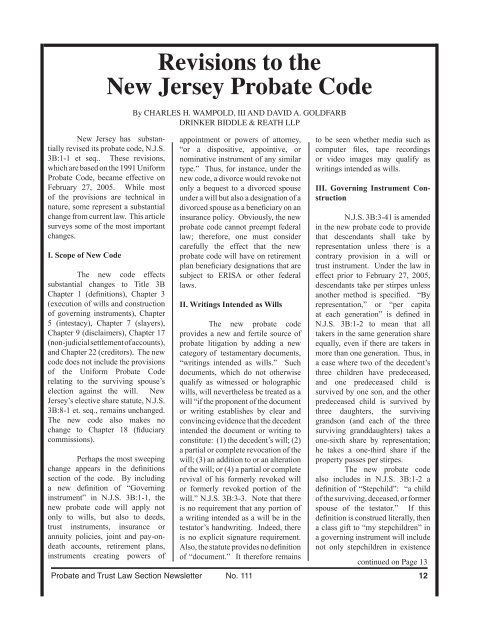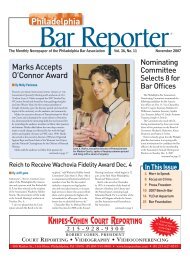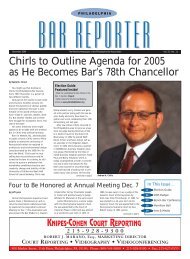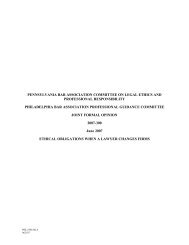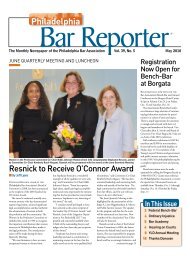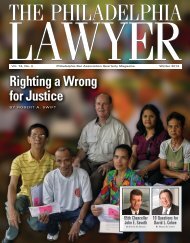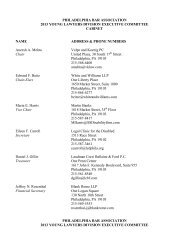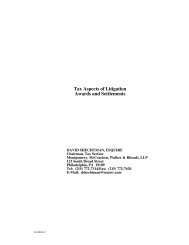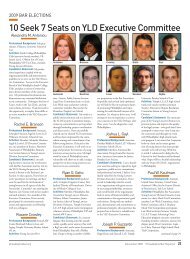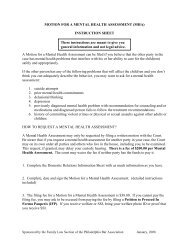Probate & Trust Newsletter: April 2005 - Philadelphia Bar Association
Probate & Trust Newsletter: April 2005 - Philadelphia Bar Association
Probate & Trust Newsletter: April 2005 - Philadelphia Bar Association
You also want an ePaper? Increase the reach of your titles
YUMPU automatically turns print PDFs into web optimized ePapers that Google loves.
Revisions to the<br />
New Jersey <strong>Probate</strong> Code<br />
New Jersey has substantially<br />
revised its probate code, N.J.S.<br />
3B:1-1 et seq.. These revisions,<br />
which are based on the 1991 Uniform<br />
<strong>Probate</strong> Code, became effective on<br />
February 27, <strong>2005</strong>. While most<br />
of the provisions are technical in<br />
nature, some represent a substantial<br />
change from current law. This article<br />
surveys some of the most important<br />
changes.<br />
I. Scope of New Code<br />
The new code effects<br />
substantial changes to Title 3B<br />
Chapter 1 (definitions), Chapter 3<br />
(execution of wills and construction<br />
of governing instruments), Chapter<br />
5 (intestacy), Chapter 7 (slayers),<br />
Chapter 9 (disclaimers), Chapter 17<br />
(non-judicial settlement of accounts),<br />
and Chapter 22 (creditors). The new<br />
code does not include the provisions<br />
of the Uniform <strong>Probate</strong> Code<br />
relating to the surviving spouse’s<br />
election against the will. New<br />
Jersey’s elective share statute, N.J.S.<br />
3B:8-1 et. seq., remains unchanged.<br />
The new code also makes no<br />
change to Chapter 18 (fiduciary<br />
commissions).<br />
Perhaps the most sweeping<br />
change appears in the definitions<br />
section of the code. By including<br />
a new definition of “Governing<br />
instrument” in N.J.S. 3B:1-1, the<br />
new probate code will apply not<br />
only to wills, but also to deeds,<br />
trust instruments, insurance or<br />
annuity policies, joint and pay-ondeath<br />
accounts, retirement plans,<br />
instruments creating powers of<br />
By CHARLES H. WAMPOLD, III AND DAVID A. GOLDFARB<br />
DRINKER BIDDLE & REATH LLP<br />
appointment or powers of attorney,<br />
“or a dispositive, appointive, or<br />
nominative instrument of any similar<br />
type.” Thus, for instance, under the<br />
new code, a divorce would revoke not<br />
only a bequest to a divorced spouse<br />
under a will but also a designation of a<br />
divorced spouse as a beneficiary on an<br />
insurance policy. Obviously, the new<br />
probate code cannot preempt federal<br />
law; therefore, one must consider<br />
carefully the effect that the new<br />
probate code will have on retirement<br />
plan beneficiary designations that are<br />
subject to ERISA or other federal<br />
laws.<br />
II. Writings Intended as Wills<br />
The new probate code<br />
provides a new and fertile source of<br />
probate litigation by adding a new<br />
category of testamentary documents,<br />
“writings intended as wills.” Such<br />
documents, which do not otherwise<br />
qualify as witnessed or holographic<br />
wills, will nevertheless be treated as a<br />
will “if the proponent of the document<br />
or writing establishes by clear and<br />
convincing evidence that the decedent<br />
intended the document or writing to<br />
constitute: (1) the decedent’s will; (2)<br />
a partial or complete revocation of the<br />
will; (3) an addition to or an alteration<br />
of the will; or (4) a partial or complete<br />
revival of his formerly revoked will<br />
or formerly revoked portion of the<br />
will.” N.J.S. 3B:3-3. Note that there<br />
is no requirement that any portion of<br />
a writing intended as a will be in the<br />
testator’s handwriting. Indeed, there<br />
is no explicit signature requirement.<br />
Also, the statute provides no definition<br />
of “document.” It therefore remains<br />
to be seen whether media such as<br />
computer files, tape recordings<br />
or video images may qualify as<br />
writings intended as wills.<br />
III. Governing Instrument Construction<br />
N.J.S. 3B:3-41 is amended<br />
in the new probate code to provide<br />
that descendants shall take by<br />
representation unless there is a<br />
contrary provision in a will or<br />
trust instrument. Under the law in<br />
effect prior to February 27, <strong>2005</strong>,<br />
descendants take per stirpes unless<br />
another method is specified. “By<br />
representation,” or “per capita<br />
at each generation” is defined in<br />
N.J.S. 3B:1-2 to mean that all<br />
takers in the same generation share<br />
equally, even if there are takers in<br />
more than one generation. Thus, in<br />
a case where two of the decedent’s<br />
three children have predeceased,<br />
and one predeceased child is<br />
survived by one son, and the other<br />
predeceased child is survived by<br />
three daughters, the surviving<br />
grandson (and each of the three<br />
surviving granddaughters) takes a<br />
one-sixth share by representation;<br />
he takes a one-third share if the<br />
property passes per stirpes.<br />
The new probate code<br />
also includes in N.J.S. 3B:1-2 a<br />
definition of “Stepchild”: “a child<br />
of the surviving, deceased, or former<br />
spouse of the testator.” If this<br />
definition is construed literally, then<br />
a class gift to “my stepchildren” in<br />
a governing instrument will include<br />
not only stepchildren in existence<br />
continued on Page 13<br />
<strong>Probate</strong> and <strong>Trust</strong> Law Section <strong>Newsletter</strong> No. 111 12


